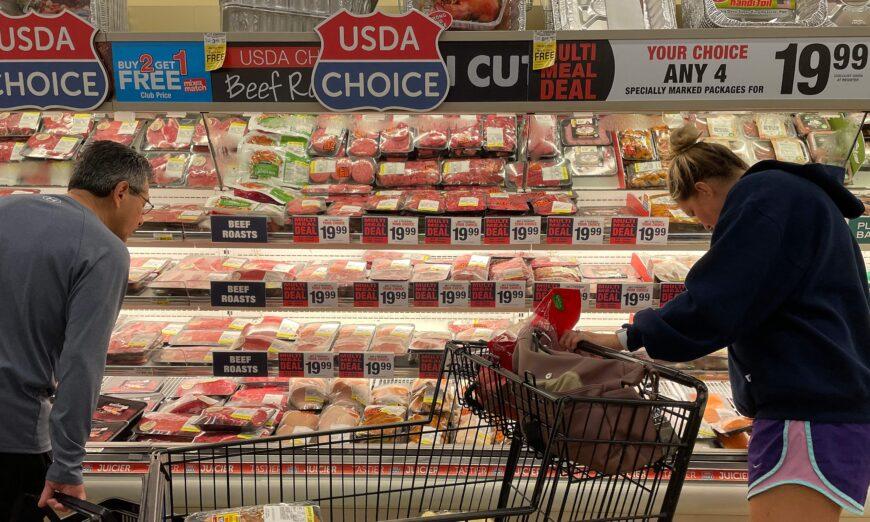Where’s the Beef? Ranchers Take Stand Over Synthetic ‘Meat’ Label

All Global Research articles can be read in 51 languages by activating the Translate Website button below the author’s name.
To receive Global Research’s Daily Newsletter (selected articles), click here.
Click the share button above to email/forward this article to your friends and colleagues. Follow us on Instagram and Twitter and subscribe to our Telegram Channel. Feel free to repost and share widely Global Research articles.
***
American cattlemen are readying for a fight to protect the definition of the word meat from producers of synthetic cellular-based beef alternatives.
“It’s a red line. It isn’t right that these factory-made products should be able to market and sell their products off the backs of the cattleman,” Justin Tupper, President of the United States Cattlemen’s Association, told The Epoch Times.
“We are talking about chemical-laced cell-cultured products that can in some ways simulate meat, but they aren’t meat, and the American consumer needs to understand that,” added Mr. Tupper.
The synthetic “meat” market has already arrived in America.
Last year, the USDA gave two producers the green light to start producing and selling their lab-grown chicken-like products in the United States.

Consumers shop for meat at a grocery store in Annapolis, Md., on May 16, 2022. (Jim Watson/AFP/Getty Images)
While a decision over the labeling of the product has yet to be announced, the cattle industry plans on being aggressively proactive in both discussions with the USDA and, if needed, litigation after having learned a valuable lesson from the dairy farmers.
“The milk industry really dropped the ball,” said Mr. Tupper. “They never believed that anyone would think that almond milk was actual milk, so they brushed it off at the time. Now there are hundreds of items with milk in the name but with no milk in the product, and it has really hurt the entire dairy industry.”
“In the same way that you can’t milk an almond, you can’t get meat from a lab, only an animal, and we are not going to allow them to use our name to promote their product.”
Synthetic meat-like products are created by taking cells acquired from animals and placing them in a warm, sterile area, usually, a metal vat, where they are then combined with a solution of chemicals that causes the cells to double once a day.
The demand for synthetic meat has been spurred largely by corporate entities and government agencies working in tandem with the environmental movement.
Bill Gates, an investor in Upside Foods, one of the two synthetic meat producers approved by the USDA, believes meat alternatives are needed to save the world from upcoming catastrophic climate events caused by greenhouse gasses.
In a 2021 interview with Technology Review, Mr. Gates said that all well-off nations need to switch to be completely weaned off of living, breathing cows.
“All rich countries should move to 100% synthetic beef. You can get used to the taste difference, and the claim is they’re going to make it taste even better over time,” Mr. Gates told the interviewer. “Eventually that green premium is modest enough that you can sort of change the people or use regulation to totally shift demand. So for meat in the middle-income-and-above countries, I do think it’s possible.”
A switch from animal meat to a laboratory-grown substitute would eliminate the need for animals to be bred and slaughtered—in the U.S. alone, around 9 billion chickens and 32 million cattle are killed every year.
However, beef cattle production constitutes only a small fraction of the gasses that many environmentalists claim have had a negative impact on the planet.
Just 2 percent of total greenhouse gas emissions in the United States come from beef cattle production, while energy production and transportation produce a combined 54 percent of emissions, according to the U.S. Environmental Protection Agency.
Italian Ban
American ranchers aren’t the only ones raising the alarm. After two million Italians signed a petition calling for a ban against synthetic meat products, the Italian Senate passed a bill earlier this week, becoming the first country to make it illegal to produce or market the food, highlighting health concerns as the primary reason.
Ettore Prandini, President of Coldiretti, the largest association representing Italian agriculture, touted the vote as a legislative victory for the Italian people over corporate powers, telling the media that “the products in the laboratory in the authorization processes are not equated to food but rather to products of a pharmaceutical nature.”
An April 2023 report by the United Nations on the safety of “cell-based food products” cited 53 potential health hazards, including “the potential for expression of novel toxins, toxic metabolites, or allergens or a change in expression of toxins, toxic metabolites, or allergens as a result of genomic instability.”
The report concluded with a call for additional research and funding in order to draw more definitive conclusions.
Transparency Needed
Mr. Tupper isn’t calling for a ban on synthetic foods, only transparency, and believes that despite the large push for meat alternatives coming from corporate leaders and government agencies, the American cow is here to stay.
“The simple truth is that the taste of real beef cannot be replicated and, more importantly, when people discover the chemical storm that is actually in this product they are trying to pass off as meat, consumers are going to come to the conclusion that beef should come from a cow, not from a laboratory.”
“Our hopes are that the USDA will label this product for what it is, a cellular-based derivative of chemicals,” added Mr. Tupper.
*
Note to readers: Please click the share button above. Follow us on Instagram and Twitter and subscribe to our Telegram Channel. Feel free to repost and share widely Global Research articles.
Featured image is from Pinterest/NaturalNews

